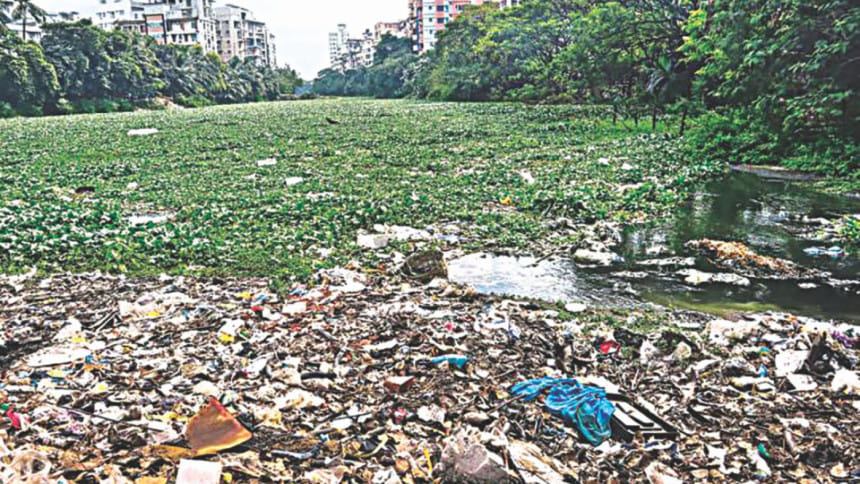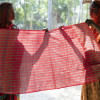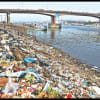Beat Plastic Pollution

In 2014, the United Nations Secretary General said: "There is no Plan B because we do not have a Planet B." Since its inception in 1974, World Environment Day has grown to become a global platform for public outreach and it is now celebrated in more than 100 countries. The call to action for the World Environment Day 2018 is "Beat Plastic Pollution". Plastic pollution is a pressing environmental concern that requires our collective action.
Plastics have become a part of our everyday life. To organise a meeting or a workshop, we often use plastic water bottles, plastic plates, plastic forks and spoons, plastic cups for tea or coffee with plastic stir sticks, all carried to the meeting using plastic bags. In Dhaka city, about 14 million pieces of polybags are thrown out every day, often ending up in rivers and oceans and causing hazards to marine life. Bangladesh experienced floods in urban areas in 1998 and 2008 where polythene and plastic materials were one of the major causes for the blockage of the drainage systems. A recent report published by Earth Day Network (2018) ranked Bangladesh 10th out of the top 20 plastic polluting countries in the world. Plastic contributes eight percent of the country's waste which is equivalent to 800,000 tonnes, of which around 200,000 tonnes go into the ocean and rivers.
Globally, one million plastic bottles are purchased every minute. A report produced by the World Economic Forum (2018) found that by 2050, there will be more plastic than fish in the world's oceans due to 13 million tonnes of plastic ending up in the ocean each year. Most used plastic materials are non-biodegradable and decompose at different rates. Managing plastic waste is increasingly becoming a global environmental and economic challenge. Plastic waste is a risk to public health as it enters our food chain, creates congestion problems in drains, causing flooding, ends up in river beds and oceans, depleting ecosystems and marine biodiversity, and makes solid waste management more expensive as landfills and open incineration do not provide an acceptable solution for disposal.
Moreover, the production process for plastic produces greenhouse gas, thus contributing to climate change. It is time for Bangladesh, and the world, to introduce alternatives to plastic.
Bangladesh, which became the first country in the world to ban polythene bags in 2002, made a voluntary commitment last year at the Ocean Conference in New York to significantly prevent and reduce marine pollution by 2025. To beat plastic pollution, we need to entirely redesign or rethink our behaviours relating to the consumption and production of plastic. World Environment Day could be a turning point to inspire innovators, producers, consumers, activists, the media and political leaders countrywide to do more than just clean up and recycle existing plastics. It is time for research and investment to lead to suitable, environmentally-friendly and affordable alternatives to plastic.
We all have a role to play. As individuals, we can reduce our plastic pollution and be more environmentally conscious by avoiding single-use plastics (e.g. straws, cups, cutlery, etc.) and packaging materials (e.g. polybags). Instead we can use jute bags, glass bottles or jars, steel or ceramic cutleries and utensils, and paper-made tetra packs.
The private sector needs to invest more in producing alternatives and biodegradable plastics and in phasing out the production of plastic. More research and technology investment and development is required to make alternatives to plastic that are economically viable and affordable.
The government should play a leading role by enacting strong policies and regulations that will encourage a more sustainable model for the design and production of plastics. Technical and financial incentives from the government are instrumental for the transformation of the existing production system to a more sustainable one. The introduction of Deposit Return Schemes through which a deposit is paid upon purchase and refunded upon return, could make a difference.
Finally, we need to change our existing corporate culture and behaviours relating to the use of plastics. In our offices and workplaces, we should ban the use of single-use plastic and packaging materials. We can serve tea or coffee in ceramic cups, and water in pitchers and glasses instead of plastic water bottles. We can make our offices green and minimise our plastic pollution footprint.
If plastic pollution continues at the current pace, Bangladeshis will be living on islands of plastic, not chars. The time for action is now. Let's beat plastic pollution.
Mia Seppo is UN Resident Coordinator in Bangladesh.










Comments